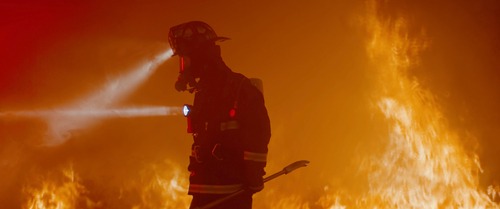
With wildfires more aggressive than ever, and climate change threatening worse to come, a bicameral collection of lawmakers introduced the Wildland Firefighter Paycheck Protection Act (H.R. 5169) this week to boost recruitment, retention and well-being of federal firefighters.
Chief sponsor of the bill U.S. Rep. Joe Neguse (D-CO) was joined by fellow U.S. Reps. Brian Fitzpatrick (R-PA), Gerry Connolly (D-VA), Scott Franklin (R-FL), Josh Harder (D-CA), Katie Porter (D-CA), and Lori Chavez-DeRemer (R-OR). Companion legislation was introduced in the Senate last month, backed by U.S. Sens. Kyrsten Sinema (I-AZ), John Barrasso (R-WY), Joe Manchin (D-WV), Steve Daines (R-MT), Jon Tester (D-MT), and Alex Padilla (D-CA).
“Our federal wildland firefighters are on the frontlines of every wildfire in our country,” Neguse said. “They are irreplaceable. For years, many of us have fought to secure critical pay raises for these brave first responders, which we successfully enacted in the Bipartisan Infrastructure Law, and it is simply unacceptable and inexcusable for Congress to not immediately renew these provisions. However, while the Wildland Firefighter Paycheck Protection Act is an important starting point, it cannot be the finish line. We need to pass this legislation to ensure our federal firefighters are fairly paid, but our work is not over.”
The bill would provide special base pay rates for wildland firefighters. Premium pay would be offered, and so would rest and recuperation time after battling the flames. Temporary pay increases had already been authorized by the Infrastructure Investment and Jobs Act, but this bill would make pay increases permanent. It would also increase access to mental health resources for firefighters.
“Wildland firefighters endure hellish conditions often living in remote areas for weeks on end, inhaling hazardous smoke, and enduring temperatures of up to 1,300 degrees Fahrenheit, all the while working for up to 18 hours a day to protect our families,” Harder said. “At the very least, they deserve a living wage and support for their mental and physical health. We can’t risk losing any more of our wildland firefighting force in the middle of wildfire season while more and more devastating wildfires put our homes and air quality at risk.”
The bill was backed by the National Federation of Federal Employees (NFFE), which dubbed the legislation critical, given that as of September 30, federal wildland firefighters face a pay cliff of a 50 percent cut to their base pay, up to $20,000.
“If this happens, a mass exodus of highly specialized firefighters will begin that may be impossible to stop,” Randy Erwin, NFFE president, said.




